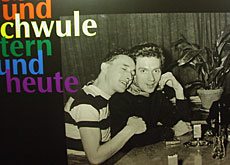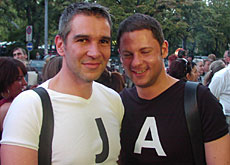Switzerland reveals its “shameless” past

An exhibition in Zurich is opening the closet on Switzerland's homosexual history.
Titled “Shameless”, the collection of photographs, interviews, artwork and music chronicles gay society in Switzerland from 1836 until the present day.
The year 1836 is seen as a landmark date in gay history since that year saw the publication of a pioneering book, “Eros”, by Swiss writer Heinrich Hössli.
“Hössli was the first person in western Christian society to describe homosexuality as a natural variation, thereby refuting claims that gay people were sinful, criminal or sick,” explains exhibition organiser Ernst Ostertag.
Ostracised
Twelve years before the enactment of the modern Swiss constitution, Hössli’s ideas were a long way ahead of their time. Ostracised by his countrymen, he emigrated to the United States and died a lonely pauper.
Subsequent sections of the exhibition witness a gradual change in attitudes, however.
In 1938, the Swiss parliament passed a law stating that homosexuality among adults was not a punishable crime, making Switzerland the first country to decriminalise the gay lifestyle.
Safe haven
Following the fall of France to the Nazis in 1940, Zurich in particular emerged as a safe haven for homosexuals fleeing Switzerland’s fascist neighbours.
Colourful covers from the groundbreaking “Der Kreis” magazine along with cabaret posters and black-and-white theatre stills are displayed by the exhibition organisers as a tribute to the freedom enjoyed in Zurich at the time.
Return of repression
It wasn’t to last, though. The murder of two middle-class homosexuals by rent boys in 1957 had a particularly damaging effect, with the Zurich police and media increasingly associating homosexuality with crime.
“One of the men murdered was the composer Robert Oboussier, who had become quite well known for his church and operatic music,” recalls Ostertag.
“When it was discovered that he had been homosexual, no one played his music anymore. We have found some recordings from before his death, though, which visitors to the exhibition will be able to hear.”
Equal rights and AIDS
A few metres away from Oboussier’s classical offerings, another set of headphones takes visitors into the world of lesbian rock and pop as the exhibition turns its attention to the equal rights campaigns of the 1960s and 70s and the devastating arrival of Aids in the mid-80s.
“Switzerland was hit much harder than other European countries by the initial outbreak of AIDS,” says Ostertag, “perhaps because the gay population here was relatively wealthy and many gay men were flying over to California for sex holidays. Whatever the reason, the rates of infection here were horrendous.
“But Switzerland was also at the forefront in the positive handling of Aids. The emphasis placed both on solidarity for the victims and on preventative measures for the future was singled out by the World Health Organisation as the successful “Swiss model”. Now, in Switzerland at least, the rate of infection among gay men is finally falling.”
Rainbow culture
The final section of the exhibition serves as a multicoloured celebration of what the organisers are calling “the rainbow culture” of the 1990s. Portraying the campaigns, activities and ongoing battles of Switzerland’s various gay groups, it certainly seems a long way from the persecution of Heinrich Hössli in the 1830s.
But if the Zurich exhibition teaches anything, it is that no one can predict the constantly changing attitudes of society.
“It’s possible of course that the situation could all change again, and gay people could once more be forced to live their lives behind closed curtains,” Ostertag warns.
“The main thing is to be aware, because democracy isn’t something that you simply reach or get given – the only way democracy works is when you constantly fight for it.”
The “Shameless” exhibition is being held at Zurich’s town hall until January 18. Most of the exhibition’s text is in German, but English language tours can be arranged in advance by telephone.
swissinfo, Mark Ledsom, Zurich

In compliance with the JTI standards
More: SWI swissinfo.ch certified by the Journalism Trust Initiative

You can find an overview of ongoing debates with our journalists here. Please join us!
If you want to start a conversation about a topic raised in this article or want to report factual errors, email us at english@swissinfo.ch.